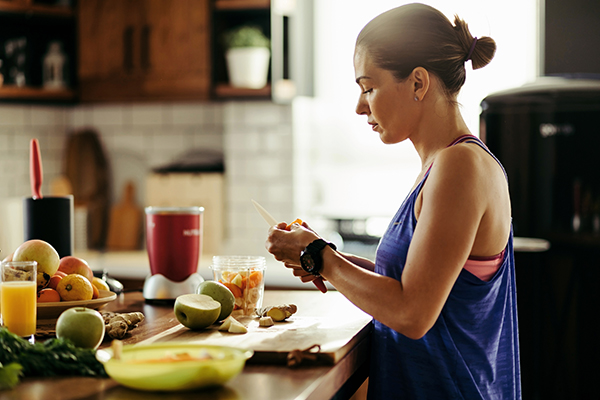How Many Calories Does It Take to Lose a Pound of Fat?

It takes 3,500 calories to lose a pound, or so goes an old “rule” about weight loss. The idea is that, since a pound of fat equals 3,500 calories, you can lose it by simply creating an equivalent calorie deficit: burn 3,500 calories or eat 3,500 fewer calories.
But weight loss is more than a math equation, says Sonya Angelone, MS, RDN, and spokesperson for the Academy of Nutrition and Dietetics.
“For most people, 500 calories is a modest reduction and one that is realistic to maintain. However, it doesn’t naturally translate to a pound of weight loss per week.”
That’s because the number of calories it takes to lose a pound varies from person to person, and can even change from week to week. In fact, the 3,500-calorie rule can significantly overestimate the amount of expected weight loss, because it doesn’t account for important factors like the decrease in energy you expend as you lose weight.
“As those pounds come off, your metabolic rate goes down because there’s less of you,” says Andrea N. Giancoli, MPH, RD.
Another problem with the 3,500-calorie rule: If you approach weight loss as a simple “calories in, calories out” equation, you may be tempted to severely restrict your calorie intake to create a bigger deficit. But that can backfire by slowing down your metabolism.
“Then you don’t require as many calories, so weight loss will slow down,” Angelone says.
Dietary restriction can also lead to decreased muscle mass, which further hinders your weight-loss efforts.
So How Many Calories Should You Eat a Day?
On average, adult men need about 2,500 calories a day while adult women need about 2,000, but there is no single number of calories that is right for everyone. There are, however, formulas that can help you figure out the general range that’s right for you.
That number depends on whether you want to maintain, lose, or gain weight. It also relies on various factors such as your gender, age, height, current weight, activity level, and metabolic health.
Before you determine how many calories you should eat a day, it’s important to understand why you need calories.
We use the energy from food (aka calories) to live and breathe, grow and repair cells, circulate blood, and adjust hormone levels, and for many other processes that hum away even when we’re parked on the couch.
These functions make up our basal metabolic rate (BMR), also called resting metabolism. This is the minimum number of calories you should consume each day; dipping below that number can actually sabotage your weight-loss efforts.
Of course, physical activity — whether we’re talking about mundane tasks like folding laundry or more vigorous endeavors like going for a run — burns additional energy. And genes, hormones, and gut bacteria also play a role in how your body uses calories, Angelone says.
So how many calories do you need each day? There’s no one-size-fits-all answer for this — it depends on your age, your size, how much muscle you have, your activity level, and your weight goals. (You can estimate your daily calorie goal based on these factors using the National Institute of Health’s Body Weight Planner.)
But Not All Calories Are Created Equal

A calorie is a calorie, right? Well, not really. While you don’t want to consume more calories than you need, research suggests weight loss isn’t just about the number of calories you eat and burn, but also where those calories come from.
Let’s put it this way: Your body will respond differently to 400 calories’ worth of roasted chicken and steamed veggies versus the same calorie allotment of soda and donuts.
“It’s important that we choose quality foods rather than empty calories,” Giancoli says. Otherwise, it’s easy to miss out on important nutrients.
High-quality foods — like whole grains, lean protein, nuts, fruit, vegetables — help support sustainable weight loss over time. There are plenty of nutritious foods that are naturally low-calorie, like fruits and veggies. Plus, there are smart ways to make healthier swaps for your favorite higher-calorie foods.
“Calories should be based on eating a variety of healthy, minimally processed foods,” Angelone says.
Calorie Counting: Benefits and Drawbacks
For many people, counting calories can be a great starting point. It offers a form of structure, and tracking calories can help you get a handle on what you consume, how much you consume, and when you consume it.
One of the main benefits of counting calories is that it can help you eat healthier and make more informed food choices. When you use an app to track your daily intake, you’ll probably be surprised to learn how many calories are in some of the foods and drinks you regularly consume.
As you become more aware of how many calories are in different foods, you’ll make smarter decisions when eating out or at someone else’s home. For instance, if you’re ordering a grande red eye at Starbucks (which contains two shots of espresso, whole milk, and brown sugar), this drink alone adds up to 250 calories. Not so great if you’re trying to watch your weight or stay within a certain calorie range each day.
Additionally, knowing exactly what’s in your meals allows you to keep track of how much protein, carbs, fat and fiber they contain as well as the amount of vitamins and minerals they have. This can ensure that your diet includes all the nutrients necessary for good health.
But calorie counting takes a lot of effort and time, and it’s not for everybody, Giancoli says. And the biggest problem with counting calories, Angelone says, is that we tend to focus more on numbers — not how full we are or which foods make us feel good.
Ultimately, counting calories isn’t a sustainable method for weight loss or management. For starters, when you lose weight, you won’t be able to tell if you’ve lost fat or muscle. This is bad because losing muscle slows down your metabolism and reduces the number of calories that your body needs every day.
Calorie counting also doesn’t take into account whether you’re getting enough nutrients from the food that you’re eating and how you’re feeling mentally and physically. A better way to lose weight is to eat healthy foods in moderation, exercise regularly, and drink enough water to keep yourself hydrated throughout the day.
So, bottom line? The 3,500-calorie myth is just that — a myth.
Can a combination of eating less and exercising more help you lose weight? Of course, but there’s no perfect mathematical equation for weight loss. For healthy, sustainable weight loss, focus on cutting out the junk, adding in wholesome foods, and sticking to a fitness routine you enjoy.

